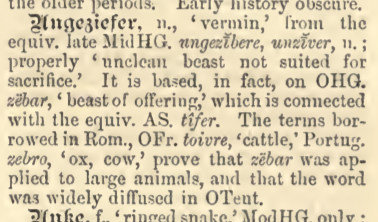Reading Kluge's Etymological Dictionary (published 1881, translated into English 1891) the word Ungeziefer has this description:
Ungeziefer, noun, 'vermin', from the equivalent late Middle High German ungezibere, unziver, noun; properly 'unclean beast not suited for sacrifice'. It is based, in fact, on Old High German zëbar, 'beast of offering', which is connected with the equivalent Anglo-Saxon tîfer. The terms borrowed in Romance, Old French toivre, 'cattle', Portugese zebro, 'ox, cow', prove that zëbar was applied to large animals, and that the word was widely used in Old Teutonic.

How transparent was the religious connotation of this in the beginning of the 20th century? How transparent is it today amongst Germans?
Wiktionary and Wikipedia also lists the word Geziefer with about same meaning as the negated word: "lästige, unerwünschte, schädliche kleine Tiere, vor allem Insekten". This word however, I didn't find in Kluge's dictionary.
I'm interested in the religious connotation because, Franz Kafka, a jew, has the protagonist in the novella The Metamorphosis, transformed into a "ungeheuren Ungeziefer". Could this, mostly understood as a beetle or a vermin, also be understood as ritually unclean (although I think unrein is the word used in the Torah)?
